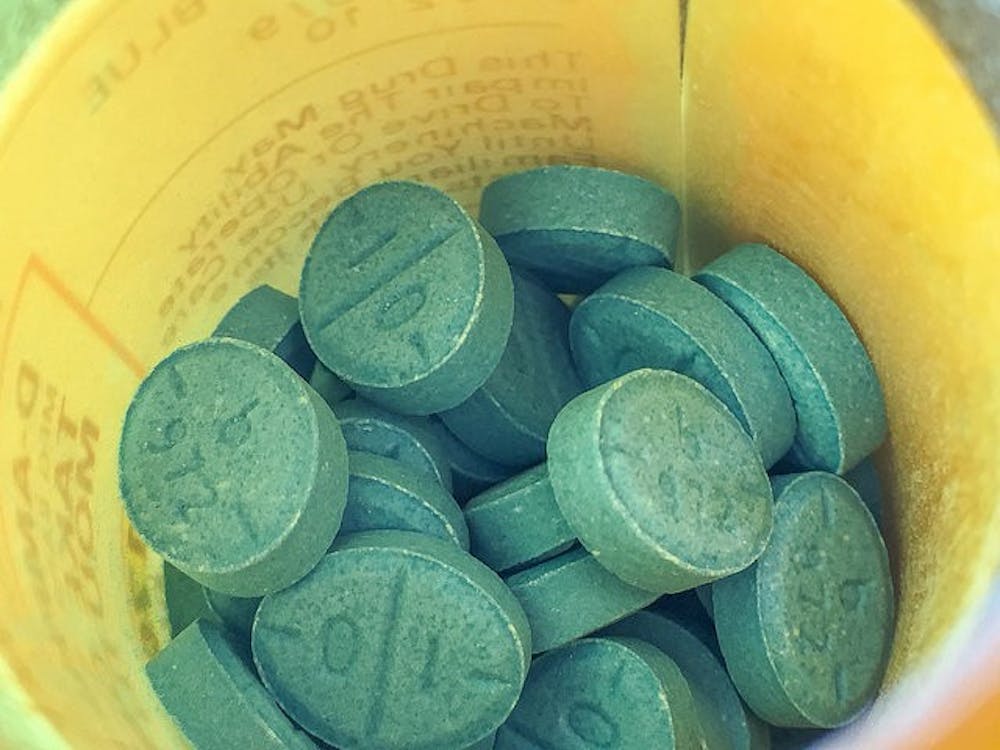* Indicates the name has been changed to protect source's identity.
When sophomore Jimmy Peters* makes his way to King Library next weekend in preparation for the arduous week of finals that awaits him, he'll make sure his bag is stocked with all the studying essentials.
Textbooks, spiral-bound notebooks, index cards, pens and pencils, water, maybe some coffee, a few snacks.
And, of course, Adderall.
Adderall is a prescription drug containing amphetamine, a central nervous system stimulant. After ingesting amphetamines, one often feels more alert and focused.
"I just feel, like, in the zone," Peters says. "I'm able to accomplish what I want to."
At one point used to give WWII soldiers some extra zing and pep before heading off to battle, amphetamines are now prescribed to treat attention disorders such as ADD and ADHD.
However, Peters does not have an attention disorder. In fact, he has never been prescribed any stimulants. So, by purchasing and ingesting Adderall, he will be breaking the law.
And he won't be the only student to do so.
Due to their stimulating effects, drugs such as Adderall, Ritalin and Vyvanse have become prevalent on college campuses. According to a 2014 study by the Partnership for Drug-Free Kids, 20 percent of college students reported abusing prescription stimulants at least once.
Dr. Joshua Hersh, a psychiatrist at Miami's Student Counseling Services, points out that one of the main reasons college students abuse these drugs is for the purpose of cramming.
"Many of these students have poor time management skills that lead to cramming," Hersh says. "These students often find themselves in desperate situations around deadlines that may contribute to cramming and taking prescription stimulants without a prescription."
Enjoy what you're reading?
Signup for our newsletter
While taking "study drugs" may help students with their academic endeavors, those who get caught could face serious repercussions.
According to Miami University Police Department Captain Ben Spilman, prescription stimulants are scheduled drugs, and possession of these controlled substances could result in a felony and over a year of jail time. Selling these drugs is also illegal and would not be treated very differently from the sale of other illegal drugs.
"Someone who sells prescription stimulants is effectively a drug dealer," Spilman says. "There's a reason these drugs are prescribed by physicians as they can have adverse health effects. We want people to be healthy on campus and only take prescription drugs in a controlled manner."
In addition to the legal consequences, students could also face repercussions from the university. According to Susan Vaughn, director of the Office of Ethics and Student Conflict Resolution, the misuse of prescription drugs represents a violation of the Code of Student Conduct. There is no mandatory sanction, but punishments could include suspension or dismissal.
However, apart from the consequences from the university and the law, another major factor for students to consider is the risks that "study drugs" pose to their mental and physical well-being.
According to Hersh, the dangers of stimulant abuse include, "anxiety, panic attacks, insomnia, weight loss and psychosis."
Hersh also notes that stimulant abuse can lead to addiction, a risk that is certainly not lost on students who decide to take them. On average, Peters uses "study drugs" about once a week, and during finals, he'll ramp that usage up to three or four times throughout the week. He is very aware of the highly addictive effects of these drugs, noting feelings of depression the day after taking them, as well as an overall sense of dependency.
"Doing schoolwork without [stimulants] is more difficult than I remember it being before I started taking them," he says. "It's definitely had a negative effect."
A fear of this sort of dependency is ultimately what keeps many students from trying them in the first place. Sophomore Zach Myers notes that while Adderall is available if he ever wanted to get any, he has never wanted to risk trying it.
"I feel like if I did, I could become hooked and rely on it to do well in school," Myers says. "I don't see anything wrong with others using it if they don't necessarily need it. But if you take it and don't need it, you could be giving into the weakness of thinking that you're not a good enough student."
While legal consequences and a danger of addiction might seem like enough to deter students from even taking the risk, "study drug" usage is still widespread across college campuses. Peters points to the competitive college environment as a justification for his decision to partake.
"I'm aware that it's basically cheating, but there's this sense that everyone else is doing it," he says. "I'm doing it to excel, to do what you're supposed to do when you go to school."
From an ethical standpoint, many students concur that the importance of academic performance outweighs the risks involved. This is true not just for those who buy the drugs, but also for those who sell them.
Senior Daniel Johnson* is diagnosed with ADHD and receives a monthly Adderall prescription. He regularly sells as much as his prescription allows him to while still staying comfortable with the amount he has left for himself.
While he does make a modest amount of money from this, he notes that his motivation is not financial. Rather, he recognizes that he has something that can be used to help his friends do well in school.
"I feel like the stresses of course loads in college can be excessive and drag people down," he says. "You have four years in college to have fun. You don't need to have that much stress."
At the same time, Johnson is as aware as anyone of the dangers of abusing stimulants, and he is careful to ensure that he does not start fueling any addictions.
"I don't like if people begin to rely on me and take advantage of what I have," he says. "I turn people down a lot."
As if to prove a point, his phone vibrates, and after reading the message, he shows it to me.
"Do you have addy or Vyvanse or anything?" the message reads. "I'm desperate."
"See, like something like that I just won't even respond to."
The widespread abuse of prescription stimulants has not gone unnoticed by Miami. Hersh notes that the university has done a number of outreaches to students about the dangers of misusing prescription drugs. Miami also launched a lockbox program this year.
"Students on prescribed medication are given a free lockbox to help prevent medication theft," he says. "The lockbox also has important messaging about how to take care of prescribed medication."
Additionally, Hersh points out that there are plenty of programs for students in academic distress.
"Student Counseling Services offers a Brain Booster Workshop designed to help improve attention and focus as well as time management skills," he says. "The Rinella Learning Center also offers similar workshops and a lot of academic assistance to students."
However, students involved in the circulation of "study drugs" feel that the problem lies more in their widespread availability. According to Johnson, there are many misconceptions about what attention disorders actually are, so many people wrongly think that they should get prescribed.
"The spectrum is really confusing," he says. "It's not the kind of thing that you can take an X-ray and see it, but hey, here's a stimulant."
Peters agrees that the heart of the problem lies in the frequency with which these drugs are prescribed.
"Doctors and parents don't do their due diligence," he says. "I've only ever met one person that actually needs it, but people can just say that they have trouble focusing and get it."
Peters believes that it's the overwhelming prevalence of "study drugs" that makes them such a widespread issue. Instead of having to navigate some shady back alley network of drug dealers, many students can often find Adderall right down the hall.
"It's the easiest thing in the world to get," Peters says. "And it shouldn't be"




